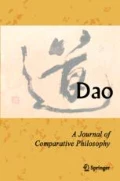Abstract
In his seminal essay “Two Concepts of Liberty,” Isaiah Berlin categorized freedom into positive or negative liberty: “freedom to” or “freedom from.” He provided a powerful critique against the metaphysical nature of positive liberty, arguing that it is oppressive, in contrast to the conception of negative freedom, defined as lack of interference. Meanwhile, conversations around the concept of freedom in Daoist philosophy often hover around categorizing it as either positive liberty in its spiritual form—what Berlin calls the “retreat to the inner citadel”—or a type of negative liberty, being free from society’s interference. In this work, I argue that it may instead be more fruitful to explore the Chinese commentarial tradition for two reasons: (1) the problem of Berlin’s liberalist framework is problematic due to its inherently Anglo-European context, and concurrently, (2) there have been rich discussions of the sociopolitical aspects of the Zhuangzi 莊子, especially by its leading Chinese commentator Guo Xiang 郭象, which have not been accounted for. Drawing from Guo Xiang, I render a reading of the concept of “free and easy wandering” (xiaoyao 逍遙) in the Zhuangzi as it directly relates to self-realization (zide 自得) and having no heart-mind (wuxin 無心), which makes for a more holistic understanding of freedom as self-determination. In particular, I argue that freedom in the philosophy of the Zhuangzi can be more aptly understood as “freedom in,” which is more viable and just than both “freedom to” and “freedom from.”
Similar content being viewed by others
References
Berlin, Isaiah. 1978/1994. Russian Thinkers. Edited by Henry Hardy and Aileen Kelly. London: Penguin Books.
______. 2002. Liberty: Incorporating Four Essays on Liberty, edited by Henry Hardy. New York: Oxford University Press.
Dennett, Daniel C. 1984. Elbow Room: The Varieties of Free Will Worth Wanting. New York: Oxford University Press.
______. 2003. Freedom Evolves. New York: Viking.
Dihle, Albrecht. 1982. The Theory of Will in Classical Antiquity. Berkeley: University of California Press.
Fox, Alan. 1996. “Reflex and Reflectivity: Wuwei in the Zhuangzi.” Asian Philosophy 6.1: 59–72.
Frede, Michael. 2011. A Free Will: Origins of the Notion in Ancient Thought. Edited by A. A. Long. Berkeley: University of California Press.
Fung, Yu-lan, trans. 2016. Chuang-Tzu: A New Selected Translation with an Exposition of the Philosophy of Kuo Hsiang. Berlin Heidelberg: Springer.
Guo, Qingfan 郭慶藩. 1961. Collective Commentaries of the Zhuangzi 莊子集釋. Beijing 北京: Zhonghua Shuju 中華書局.
Hansen, Chad. 1972. “Freedom and Moral Responsibility in Confucian Ethics.” Philosophy East and West 22.2: 169–186. https://doi.org/10.2307/1398123.
Jiang, Tao. 2012. “Isaiah Berlin’s Challenge to the Zhuangzian Freedom.” Journal of Chinese Philosophy 39.1: 69–92.
Jullien, François. 2000. Detour and Access: Strategies of Meaning in China and Greece. Trans. by Sophie Hawkes. New York: Zone Books.
Li, Chenyang. 2014. “The Confucian Conception of Freedom.” Philosophy East and West 64.4: 902–919.
Liu, Xiaogan. 2007. “Two Kinds of Xiaoyao and Two Kinds of Freedom 兩種逍遙與兩種自由.” Journal of Huazhong Normal University (Humanities and Social Sciences) 華中師範大學學報 (人文社會科學版) 6: 83–88.
______.2015. “Zhuangzi’s Philosophy: A Three Dimensional Reconstruction.” In Dao Companion to Daoist Philosophy, edited by Liu Xiaogan. New York: Springer.
Lo, Yuet-Keung. 2020. “Lone-Transformation and Intergrowth: Philosophy and Self-Justification in Guo Xiang’s Commentary on the Zhuangzi.” In Dao Companion to Xuanxue 玄學 (Neo-Daoism), edited by David Chai. Cham: Springer International Publishing.
Møllgaard, Eske. 2005. “Zhuangzi’s Notion of Transcendental Life.” Asian Philosophy 15.1: 1–18.
Oldfather, W. A. 1925. Epictetus: The Discourses as Reported by Arrian, the Manual, and Fragments. Cambridge, MA: Harvard University Press.
Perkins, Franklin. 2014. Heaven and Earth Are Not Humane: The Problem of Evil in Classical Chinese Philosophy. Bloomington and Indianapolis: Indiana University Press.
Plantinga, Alvin. 1977. God, Freedom, and Evil. Grand Rapids, Michigan: Eerdmans Publishing Company.
Shang, Geling. 2006. Liberation as Affirmation: The Religiosity of Zhuangzi and Nietzsche. Albany: State University of New York Press.
Tan, Sor-Hoon. 2012. Confucian Democracy: A Deweyan Reconstruction. SUNY Series in Chinese Philosophy and Culture. Albany: State University of New York Press.
Valmisa, Mercedes. 2019. “The Happy Slave Isn’t Free: Relational Autonomy and Freedom in the Zhuangzi.” Philosophy Compass 14.3: e12569.
Van Norden, Bryan W. 2016. “Zhuangzi’s Ironic Detachment and Political Commitment.” Dao: A Journal of Comparative Philosophy 15.1: 1–17.
Vatican, The. 2019. Catechism of the Catholic Church, revised ed. New York: Bloomsbury Publishing.
Wenzel, Christian, and Kai Marchal. 2017. “Chinese Perspectives on Free Will.” In The Routledge Companion to Free Will, edited by Kevin Timpe, Meghan Griffith, and Neil Levy. London: Routledge.
Zhao, Guoping. 2015. “Transcendence, Freedom, and Ethics in Lévinas’ Subjectivity and Zhuangzi’s Non-being Self.” Philosophy East and West 65.1: 65–80. https://doi.org/10.1353/pew.2015.0006.
Ziporyn, Brook. 2003. The Penumbra Unbound: The Neo-Taoist Philosophy of Guo Xiang. Albany: State University of New York Press.
______. 2009. Zhuangzi: The Essential Writings with Selections from Traditional Commentaries. Indianapolis: Hackett Publishing Company.
Author information
Authors and Affiliations
Corresponding author
Ethics declarations
The author declares that there is no conflict of interest.
Additional information
Publisher’s Note
Springer Nature remains neutral with regard to jurisdictional claims in published maps and institutional affiliations.
Rights and permissions
Springer Nature or its licensor (e.g. a society or other partner) holds exclusive rights to this article under a publishing agreement with the author(s) or other rightsholder(s); author self-archiving of the accepted manuscript version of this article is solely governed by the terms of such publishing agreement and applicable law.
About this article
Cite this article
Tan, C.A.L. “Freedom In”: A Daoist Response to Isaiah Berlin. Dao 22, 255–275 (2023). https://doi.org/10.1007/s11712-023-09881-z
Accepted:
Published:
Issue Date:
DOI: https://doi.org/10.1007/s11712-023-09881-z




